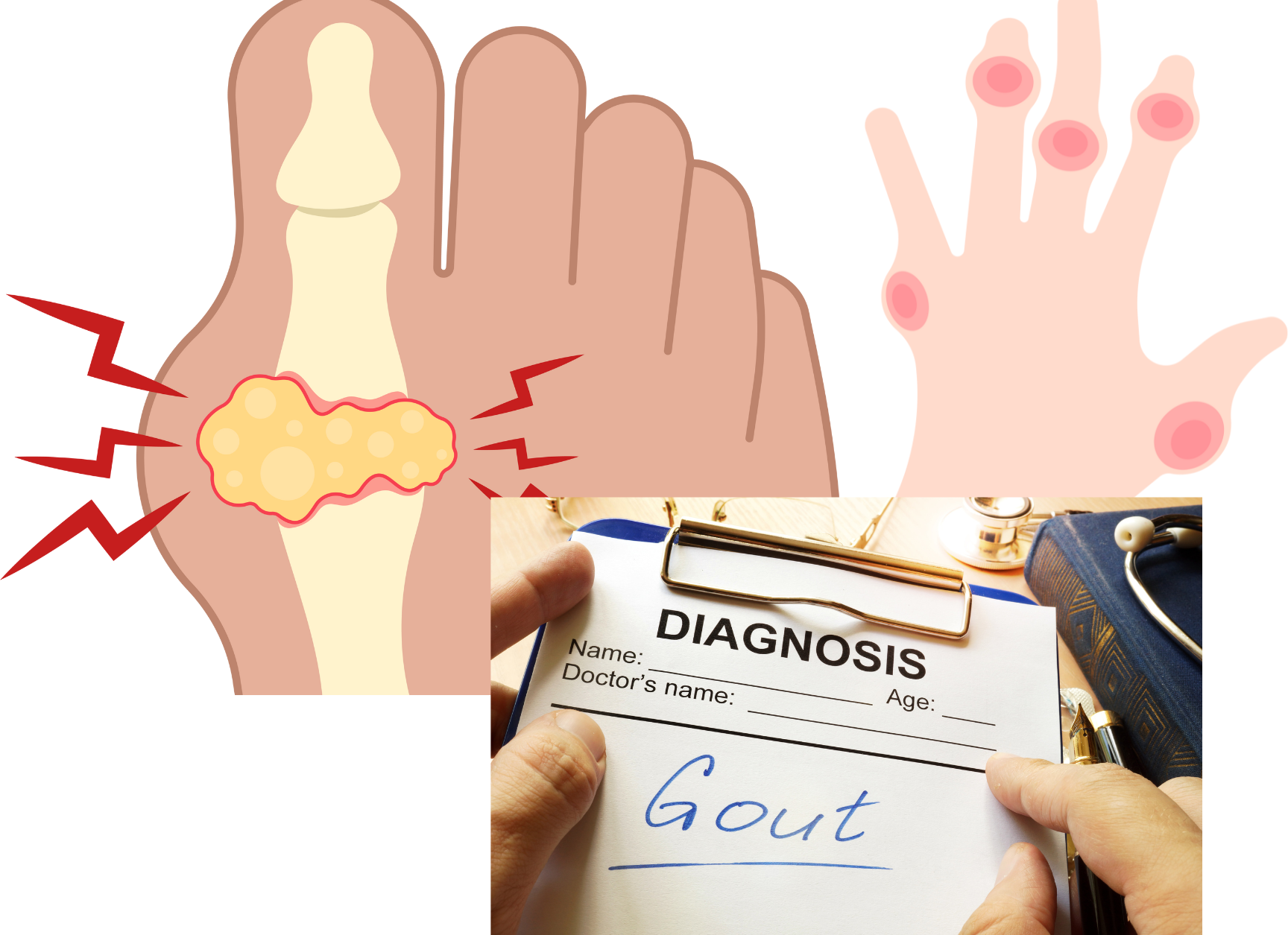Gout

What is gout?
Gout is a type of arthritis that occurs when uric acid crystals accumulate in the joints, leading to inflammation and pain. Gout can cause sudden and severe attacks of joint pain, as well as chronic joint damage if left untreated.
Who's at risk for gout?
Anyone can develop gout, but certain groups of people are at higher risk, including:
- Men, particularly those over the age of 40
- Women after menopause
- People with a family history of gout
- People with certain medical conditions, such as obesity or kidney disease
- People who consume high amounts of purine-rich foods or alcohol
What causes gout?
Gout is caused by an excess of uric acid in the body, which can be due to various factors, including:
- Inefficient removal of uric acid by the kidneys
- High intake of purine-rich foods, such as red meat or seafood
- Excessive alcohol consumption
- Certain medical conditions or medications that increase uric acid production or reduce its elimination
How does gout start?
Gout typically starts as a result of repeated or chronic exposure to high levels of uric acid in the blood. The condition may start gradually and worsen over time, or it may be triggered by specific factors such as alcohol or certain foods.
What are the symptoms of gout?
The symptoms of gout may vary depending on the severity and duration of the condition, but may include:
- Sudden and severe joint pain, particularly in the big toe, ankle, or knee
- Swelling and redness of the affected joint
- Warmth and tenderness around the affected joint
- Limited range of motion or stiffness in the affected joint
How is gout diagnosed?
Diagnosing gout involves a comprehensive evaluation of a person's symptoms, medical history, and physical exam, as well as diagnostic tests such as joint fluid analysis or blood tests to confirm the presence and severity of uric acid crystals.
How can gout be treated?
Treatment for gout may involve a range of interventions, including:
- Medications, such as nonsteroidal anti-inflammatory drugs (NSAIDs) or colchicine, which can help reduce inflammation and relieve pain during acute attacks
- Lifestyle changes, such as avoiding trigger foods or losing weight, which may help reduce uric acid levels and prevent recurrent attacks
- Medications, such as allopurinol or febuxostat, which can help reduce uric acid production and prevent recurrent attacks
What complications may occur with gout?
If left untreated or poorly managed, gout can lead to a range of complications, including:
- Chronic joint damage or deformity, particularly in cases of recurrent attacks or long-term untreated gout
- Formation of tophi, or uric acid crystals, which can cause chronic inflammation and damage to surrounding tissues
- Kidney stones or kidney damage, particularly in cases of chronic high uric acid levels
How can I prevent gout?
Preventing gout involves a range of strategies, including:
- Maintaining a healthy weight and avoiding rapid weight gain
- Eating a balanced diet that is low in purine-rich foods and alcohol
- Staying hydrated and avoiding dehydration
- Regular exercise and physical activity
Long-term management of gout
Managing gout over the long term involves ongoing monitoring of symptoms, regular healthcare provider visits, and following a treatment plan as prescribed by a healthcare provider. It may also involve making lifestyle changes to manage symptoms and prevent complications.
What is recent research saying about gout?
Recent research in gout has focused on improving diagnosis and management of the condition, as well as identifying new treatment options and risk factors. Some of the promising areas of research include:
- Investigation of the role of genetics and epigenetics in gout, which may help identify high-risk groups and improve treatment strategies
- Development of new medications or drug combinations, which may be more effective at reducing uric acid levels or preventing recurrent attacks than current treatments
- Exploration of the association between gout and other medical conditions, such as cardiovascular disease or diabetes, which may help improve overall health outcomes for people with gout
Where can I go for more information on gout?
If you or someone you know has been diagnosed with gout or wants more information on how to prevent the condition, it is important to seek help from a healthcare provider who specializes in the treatment of arthritis or rheumatology. The following organizations also provide information and resources on gout:
- Arthritis Foundation
- American College of Rheumatology
- Mayo Clinic
- National Institute of Arthritis and Musculoskeletal and Skin Diseases (NIAMS)

